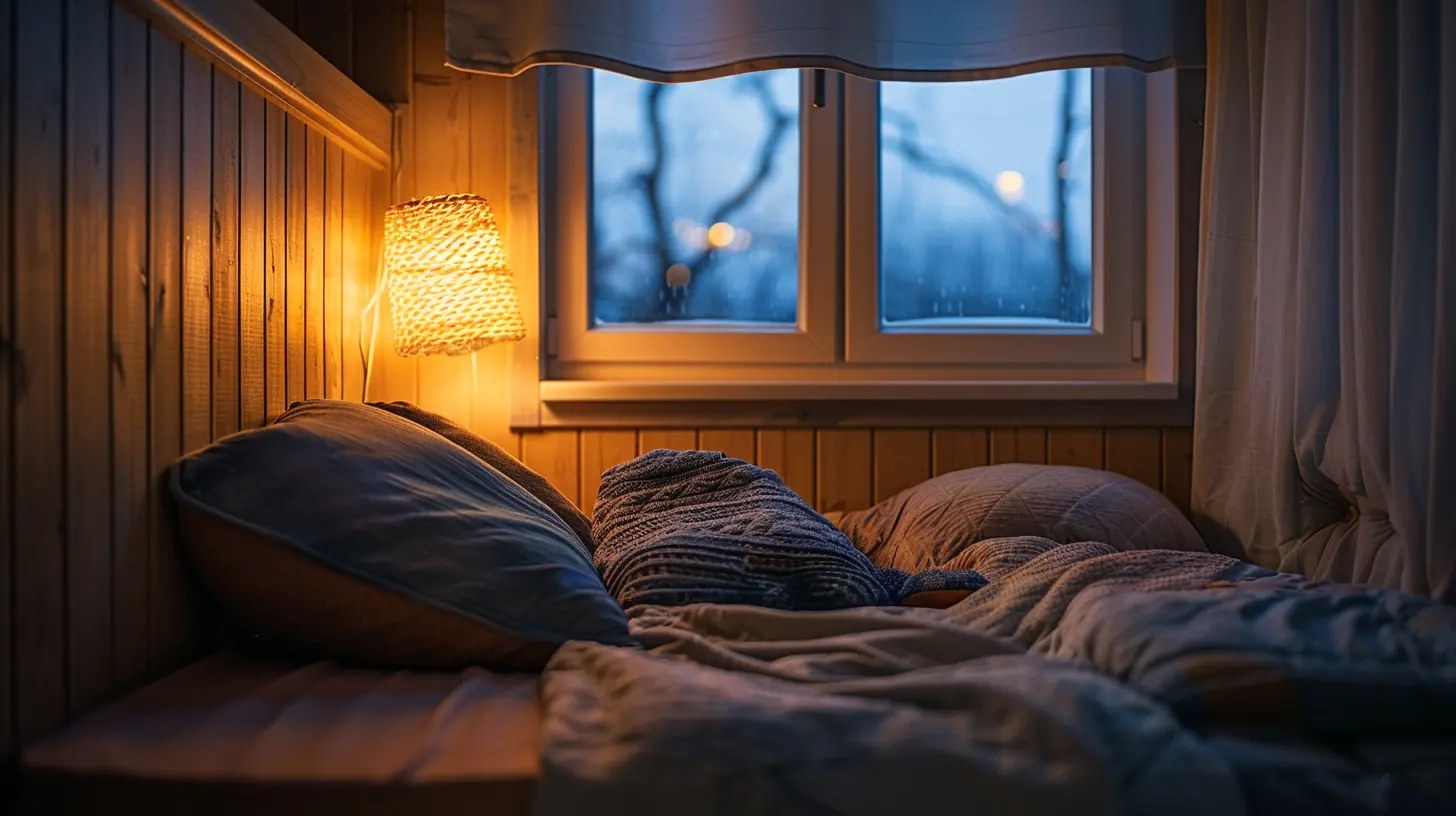Why Sleep Training Isn’t Just for Babies: Sleep Solutions for Older Kids
3 November 2025
When most people hear the phrase sleep training, their minds instantly jump to crying infants, white noise machines, and bleary-eyed parents tiptoeing out of the nursery. But here's the thing—sleep training isn’t just a one-time deal you do with babies and then forget forever. Nope, it often needs a reboot when your kids get older.
Yup, you read that right. Sleep training can (and probably should) be revisited during the toddler and school-age years. So if bedtime in your house feels like a nightly battle with negotiations, bribes, or tears (let’s be honest—sometimes both theirs and yours), you're not alone.
Let’s dive into why sleep training doesn’t stop at infancy, and how to help older kids rediscover the magic of a good night’s sleep.
Why Sleep Is Still a Struggle Past the Baby Stage
You think you’ve crossed the finish line once your baby sleeps through the night... and then BAM—your preschooler is suddenly terrified of monsters, or your 8-year-old wants to talk all night about what happened at recess. What gives?Sleep issues don’t magically disappear with age; they just... evolve. Older kids experience:
- Anxiety and overthinking (yup, their brains get busy at bedtime too)
- Environmental distractions like screens and noise
- Lack of consistent bedtime routines
- Sleep regression during developmental stages
And let’s be real—life is busier than ever. Between school, homework, after-school sports, and birthday parties every weekend, your kid’s brain is overstimulated by the time their head hits the pillow.
So yeah, sleep training might be in the past for some—but for a huge number of families, it’s still very much relevant.
Sleep Training Isn’t About Crying It Out—It’s About Building Healthy Habits
Let’s crush a myth right here: sleep training doesn’t always mean crying it out.When we talk about sleep training older kids, we’re really talking about teaching them how to wind down, self-regulate, and understand their body’s needs.
Think of it like teaching them to brush their teeth, clean up their room, or do chores. Sleep isn’t just a natural instinct—it’s also a learned skill. And some kids need more help than others in mastering it.
Common Sleep Problems in Older Kids
Let’s break down some of the most common things that sabotage your kid’s sleep.1. Trouble Falling Asleep
Kids toss and turn, unable to fall asleep even when they’re clearly exhausted. This could be due to:- Too much screen time before bed
- A lack of physical activity during the day
- Anxiety or worrying thoughts
- Unstructured bedtime routines
2. Frequent Night Waking
Does your child wake up several times a night and either calls for you or climbs into your bed? Sleep associations and fears could be at play.3. Early Morning Wake-Ups
If your kid is waking at 5 a.m. ready to play while you’re still dreaming about coffee—yeah, we feel you. This could mean they’re overtired or overstimulated before bed.4. Sleep Anxiety or Fear of the Dark
Fear of being alone, fear of the dark, or imagination running wild can all tank your kid’s ability to fall asleep.
Re-Sleep Train: Why It’s Not Too Late
Here’s the truth: It’s never too late to help your child (and your household) get better sleep. In fact, school-aged kids are often more capable of understanding the why behind sleep routines, which can make things easier in some ways.They’re old enough to participate in the process, voice their feelings, and even help design their own wind-down schedule. And when you treat it like a team effort rather than a top-down command, the results can be amazing.
Practical Sleep Training Solutions for Older Kids
Let’s get into the good stuff—what can you actually do to help your child sleep better?1. Create a Predictable Bedtime Routine
Kids thrive on routine. It gives them a sense of security and signals their brain to start winding down. Aim for a 30 to 45-minute routine leading up to lights out. It could look like:- Bath or shower
- Pajamas
- Brushing teeth
- Reading a short story
- Soft music or mindfulness breathing
Keep it calm and consistent, and avoid anything overly stimulating. No zombie video games or YouTube rabbit holes, please.
2. Set Clear Sleep Expectations
Older kids are ready to understand rules around bedtime. Talk to them (not at them) about why sleep matters. You can say things like:> “Your body grows when you sleep.”
>
> “When we sleep well, our brain learns better and we feel happier the next day.”
Establish clear boundaries, like staying in bed, and let them know what’s expected—kind of like a “bedroom contract” that you both agree on.
3. Use a Sleep Chart or Reward System (Yes, Even for Big Kids)
Sleep charts aren’t just for preschoolers. Even older kids love the satisfaction of checking off boxes or earning a small treat or privilege after a full week of following their sleep routine.The key? Keep the rewards simple and sleep-focused. Maybe 5 nights of good sleep earns a later bedtime on Friday or choosing dinner for the family.
4. Address Anxiety Head On
Sometimes, no routine or chart will fix things until you get to the root—anxiety. If your child worries at night, try:- Journaling before bed
- Scripting out “worry time” earlier in the day
- Having a small comfort object or night light
- Practicing breathing exercises together
It’s like emotional tooth-brushing—brushing away the mental plaque so their minds can rest.
5. Make the Bedroom a Sleep Sanctuary
Let’s Marie Kondo their sleep space. A cluttered, overstimulating room can keep their brains on high alert long after lights-out.- Keep screens out (or at least turn them off 1 hour before bed)
- Use blackout curtains
- Keep soft, warm lighting
- Reduce noise with a small fan or white noise
- Choose bedding that feels cozy and inviting
Think of their room as a cozy cocoon, not a sensory overload zone.
6. Encourage Daytime Activity and Sunlight
Sometimes sleep problems aren’t about night time at all. If your child isn’t getting enough physical activity or sunlight during the day, their circadian rhythm can be totally out of whack.Outdoor play + healthy movement = deeper sleep later.
What If Nothing Works?
Let’s be real—sometimes, despite your best intentions and Pinterest-worthy sleep charts, your kid is still refusing to sleep through the night.There is no shame in reaching out for help. Pediatricians, sleep specialists, and even child therapists can work wonders. Sometimes there’s an underlying issue—like ADHD, anxiety disorders, or sensory processing challenges—that needs a different approach.
You’re not failing. You’re parenting. And when you advocate for your child’s sleep, you’re doing something powerful.
The Ripple Effect of Better Sleep
When kids sleep better, everything changes.Seriously. Behavior improves. Focus gets sharper. Emotions are more balanced. They’re less cranky. You’re less cranky. The house runs smoother. It’s not just sleep—it’s transformation in disguise.
And don’t forget—you matter too.
You deserve evenings that don’t involve three hours of “just one more story.” You deserve mornings that don’t start with a 6 a.m. meltdown. Your mental health matters just as much as theirs.
Final Thoughts: Sleep Skills Are Life Skills
Sleep isn’t just a baby milestone—it’s a lifelong habit. And teaching your child how to sleep well is just as important as teaching them how to eat healthy or treat others with kindness.Sure, it takes time and effort (and probably more patience than you thought you had), but it’s worth it.
So, if you’re still in the trenches of late-night wakeups or bedtime protests with your 5-, 7-, or even 10-year-old—take a deep breath. You’re not behind. You’re not alone. And it’s definitely not too late.
Start small. Stay consistent. Love big.
And sleep? It’ll follow.
all images in this post were generated using AI tools
Category:
Sleep TrainingAuthor:

Kelly Snow
Discussion
rate this article
1 comments
Elise Cooper
Who knew sleep training could extend beyond infancy? It’s like a secret club for parents of older kids! Because if my toddler can negotiate cookies for bedtime, I can definitely negotiate better sleep—fair trade, right? Sleep on, fellow parents!
November 5, 2025 at 4:31 AM

Kelly Snow
Absolutely! Many parents find that sleep training techniques can be incredibly effective for older kids too. It’s all about finding the right balance and strategies that work for your family. Sleep well!


